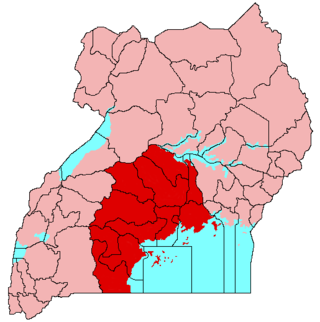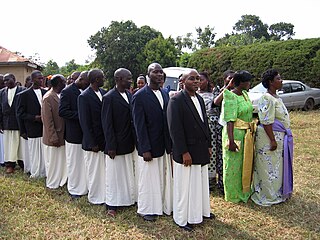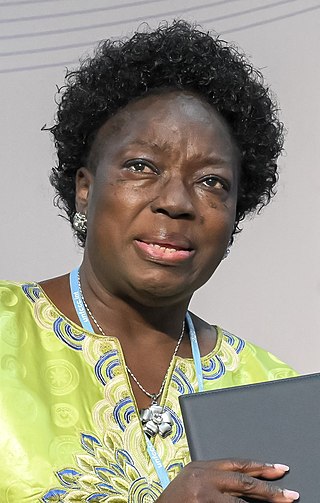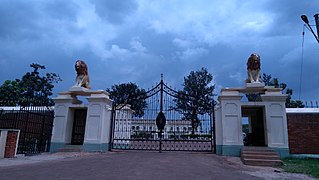Related Research Articles

Uganda, officially the Republic of Uganda, is a landlocked country in East Africa. The country is bordered to the east by Kenya, to the north by South Sudan, to the west by the Democratic Republic of the Congo, to the south-west by Rwanda, and to the south by Tanzania. The southern part of the country includes a substantial portion of Lake Victoria, shared with Kenya and Tanzania. Uganda is in the African Great Lakes region, lies within the Nile basin, and has a varied but generally modified equatorial climate. As of 2023, it has a population of around 49.6 million, of which 8.5 million live in the capital and largest city of Kampala.

Kampala is the capital and largest city of Uganda. The city proper has a population of 1,680,600 (2020) and is divided into the five political divisions of Kampala Central Division, Kawempe Division, Makindye Division, Nakawa Division, and Rubaga Division.

Buganda is a Bantu kingdom within Uganda. The kingdom of the Baganda people, Buganda is the largest of the traditional kingdoms in present-day East Africa, consisting of Uganda's Central Region, including the Ugandan capital Kampala. The 14 million Baganda make up the largest Ugandan region, representing approximately 16% of Uganda's population.

The Protectorate of Uganda was a protectorate of the British Empire from 1894 to 1962. In 1893 the Imperial British East Africa Company transferred its administration rights of territory consisting mainly of the Kingdom of Buganda to the British government.

Sir Edward Frederick William David Walugembe Mutebi Luwangula Mutesa II was Kabaka of the Kingdom of Buganda in Uganda from 22 November 1939 until his death. He was the 35th Kabaka of Buganda and the first president of Uganda from 1962 to 1966, when he was overthrown by Milton Obote. The foreign press often referred to him as King Freddie, a name rarely used in Uganda. An ardent defender of Buganda's interests, especially its traditional autonomy, he often threatened to make the kingdom independent both before and after Uganda's independence to preserve it. These firm convictions also later led to conflicts with his erstwhile political ally Milton Obote, who would eventually overthrow him.

Danieri Basammula-Ekkere Mwanga II Mukasa was the 31st Kabaka of Buganda who ruled from 1884 until 1888 and from 1889 until 1897.

Ronald Edward Frederick Kimera Muwenda Mutebi II is King of the Kingdom of Buganda. He is the 36th Kabaka of Buganda.

The Church of Uganda is a member province of the Anglican Communion. Currently there are 37 dioceses which make up the Church of Uganda, each headed by a bishop.
The Nnabagereka is the official title of the Queen consort of the Kingdom of Buganda, a traditional kingdom in modern-day Uganda. The current Nnabagereka is Sylvia Nagginda, who married Kabaka Muwenda Mutebi II of Buganda on 27 August 1999.
Sylvia Nagginda is Queen of Buganda as the wife of Ronald Muwenda Mutebi II.
King’s College Budo is a mixed, residential, secondary school in Central Uganda (Buganda).

A kanzu is a white or cream coloured robe worn by men in the African Great Lakes region. It is referred to as a tunic in English, and as the Thawb in Arab countries. The kanzu is an ankle or floor length garment. It serves as the national costume of Tanzania as well as the Comoros, where it is called/pronounced 'Kandu' as well as thawb. The robe is also worn in some coastal Muslim regions of Tanzania and Kenya. The men of Uganda consider it their most important dress. Kanzu is a Ganda word of Swahili origin, which means "robe" or "tunic". In Tanzania, the term is used interchangeably with kaftan.

Rebecca Alitwala Kadaga is a Ugandan lawyer and politician who served as the Speaker of the Parliament of Uganda from 19 May 2011 until 21 May 2021. She currently serves as the First Deputy Prime Minister of Uganda. She concurrently serves as Minister for East African Community Affairs, in the Cabinet of Uganda.
Banda is a hill that lies in Nakawa Division, within Kampala, the capital of Uganda. Banda also refers to the neighborhoods on the slopes of the hill and between Banda Hill and Kireka, extending all the way to the Kampala-Jinja Highway. The southwestern slopes of the hill are occupied by the neighbourhood known as Kyambogo, and is the location of the campus of Kyambogo University, one of the nine public universities in the country.

The Kasubi Tombs in Kampala, Uganda, is the site of the burial grounds for four kabakas and other members of the Baganda royal family. As a result, the site remains an important spiritual and political site for the Ganda people, as well as an important example of traditional architecture. It became a UNESCO World Heritage Site in December 2001, when it was described as "one of the most remarkable buildings using purely vegetal materials in the entire region of sub-Saharan Africa".

The Baganda also called Waganda, are a Bantu ethnic group native to Buganda, a subnational kingdom within Uganda. Traditionally composed of 52 clans, the Baganda are the largest people of the Bantu ethnic group in Uganda, comprising 16.5 percent of the population at the time of the 2014 census.
Uganda has a very long and, quite permissive, and sometimes violent history regarding the LGBT community, stretching back from the pre-colonial period, through British colonial control, and even after independence.

Nantale Elizabeth is a princess in the Kingdom of Buganda, a historic kingdom in modern-day Uganda. She is the granddaughter of Daudi Chwa II of Buganda.
Sugra Visram, also known as Sugra Namubiru Visram, was a Ugandan politician, activist and businesswoman. She was one of the first female members of parliament co-opted into the Buganda Lukiiko by Kabaka Muteesa II. Affiliated to the Kabaka Yekka Party, she represented Kibuga Constituency in Uganda's First and Second Parliaments till she resigned as a member of parliament in 1966. Together with Florence Alice Lubega and Eseza Makumbi, she was one of the first three women to serve in this position in post-independence Uganda.

Twekobe aka Twekobe Palace is the official residence (building) for the Kabaka of Buganda and it is located with in the Lubiri. Its Wiki Loves Monuments ID: UG-C-048.
References
- ↑ earle, jonathon l (2012), Akyeampong, Emmanuel K.; Gates, Henry Louis (eds.), "Mulira, Rebecca", Dictionary of African Biography, Oxford University Press, doi:10.1093/acref/9780195382075.001.0001, ISBN 978-0-19-538207-5 , retrieved 2020-04-15
- ↑ "Finding AidEridadi M.K. Mulira Papers: Cambridge Centre of African Studies" (PDF). Retrieved 15 April 2020.
- ↑ "Let's remember Rebecca Mulira". www.newvision.co.ug. 2001-12-30. Retrieved 2020-04-15.
- ↑ "Honouring Women in Africa". Business Insider. 29 January 2018. Retrieved 15 April 2020.
- ↑ "Kabaka Hails Rebecca Mulira". allafrica. Retrieved 15 April 2020.